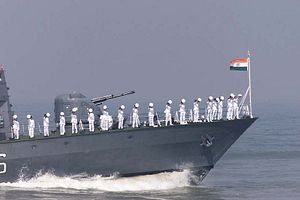Can India ever become a great power? This question, which is, of course, important to understanding the future trajectory of global power politics, was put to three prominent Indian analysts and policymakers at a panel at the Carnegie Endowment for International Peace in Washington, DC, on Monday.
The panel, which was hosted by the center’s Milan Vaishnav, featured Ashley J. Tellis, a senior associate at the Carnegie Endowment, Devesh Kapur, the director of the Center for the Advanced Study of India, and Arvind Subramanian, the chief economic adviser to the government of India. The panel marked the recent opening of Carnegie India, the sixth international center of the Carnegie Endowment for International Peace, in New Delhi, an indication of Carnegie’s belief that India will be a big story in the decades to come, no matter what policies it pursues.
All three panelists agreed that India has to make difficult decisions and undergo a transformation in order to move forward on the political and economic reforms necessary to become a great power. The three offered varying levels of optimism as to whether or not these decisions would actually take place.
Tellis, one of the world’s top India experts and author of a new report entitled “India as a Leading Power,” was the most upbeat on the question of whether India can become a great power. Understanding Indian Prime Minister Narendra Modi’s call for India to become a leading power instead of a balancing power as modest, he argued that India could become a true pole in the international system by 2050 if it vigorously pursues this goal. This would require Modi to use his vision as a catalyst to unite Indian elites in “finishing the renovations necessary to make India a great power,” Tellis wrote in his report.
Modi is definitely “cognizant of the need for comprehensive transformation,” Tellis wrote in his report. However, much of this transformation remains in the realm of the potential because of the realities of India’s political structure and underdeveloped human capital, as Kapur argued. Summing up the gist of the problem India faces in becoming a great power, Kapur made the point that while India is ambivalent about the use of power in the international arena, its politicians have “no ambivalence” about the use of power “within their own country.” In other words, India is so self-involved in domestic affairs that reforms designed to make it a great power internationally are never the primary concerns of its politicians.
According to Kapur, India has made little effort to fundamentally change the structure of its state since independence, when it inherited a colonial framework that was not constructed to govern a modern citizen-oriented state. As a result, many of the key aspects of nation-building did not–and cannot–occur. Kapur cited the problem of primary education in India, which could have transformed social norms and improved human capital, but is now “fragmented,” because of the mushrooming of private schools. Kapur also argued that India’s first-past-the-post electoral system increases social cleavages because it can be easily manipulated by politicians. Plus, in Kapur’s mind, there is no guarantee that the persistence of globalization will drive the Indian economy forward, as India has come to the party late. As politicians in India care more about identity politics and increasing social cleavages, instead of focusing on “building the country itself,” there is not much room for optimism in Kapur’s view.
Subramanian, who is the government of India’s chief economic advisor, described himself as an “apologist” for India and focused more on the concrete, stating that he did not know whether or not India would become a leading power, as the “expectation of big bang [economic] reforms outside of a crisis” was unlikely. Rather, he argued, given India’s realities, it needed to take an approach of creative incrementalism. Interestingly, he speculated on the nature of India’s economic growth, which, because of labor-saving technology, might be driven more by services rather than manufacturing, as long as the external global environment remains favorable. However, this strategy remains dependent on the international environment and it remains unclear if and how India’s services sector can really employ hundreds of millions of former peasants working in a globalized world.
Ultimately, there is no doubt that India has enormous potential as a great power on the world stage. Every Indian politician desires reform, but, as Tellis pointed out, there is no consensus about how to accomplish this. Therefore, in his view, the prime minister must build a consensus to push through the changes necessary because the strategy of “incrementalism” advocated by Subramanian is a method of “coping.” However, there seems to be no alternative to this strategy because of the way that India works. As Kapur pointed out, while there is no doubt that India is undergoing a major transformation at the moment as modernity changes its social and economic patterns forever, India’s public and government institutions continue to be unable to accommodate or direct its transformation, a fact that will have consequences down the road.

































